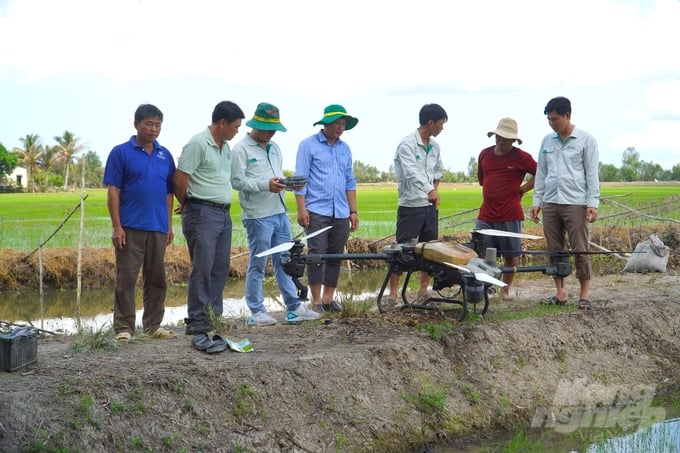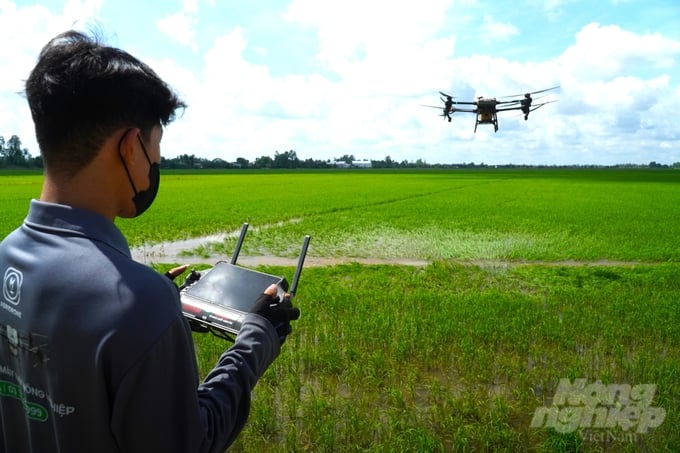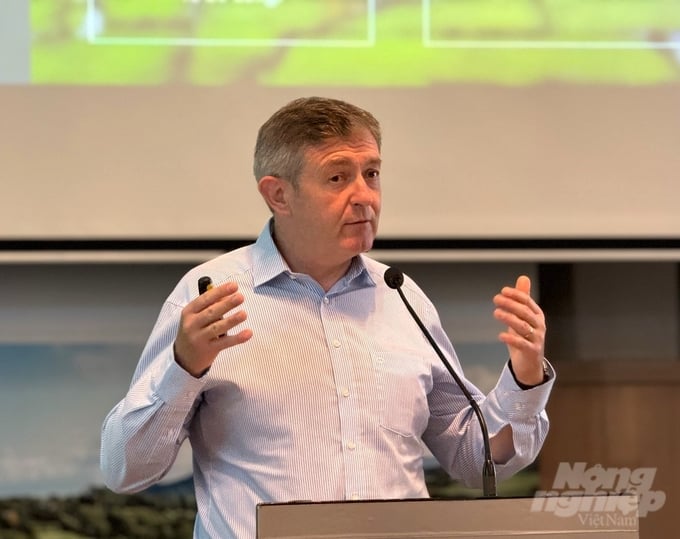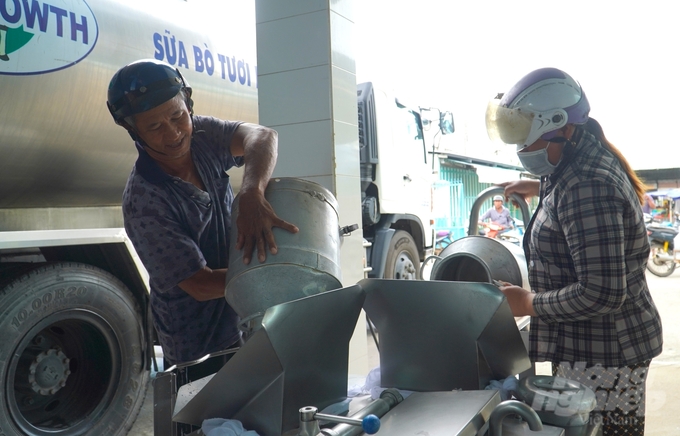November 25, 2025 | 14:22 GMT +7
November 25, 2025 | 14:22 GMT +7
Hotline: 0913.378.918
November 25, 2025 | 14:22 GMT +7
Hotline: 0913.378.918
According to data from the Department of Cooperative Economics (Ministry of Planning and Investment), the country has approximately 22,000 agricultural cooperatives out of 34,000 cooperatives, with approximately 3.8 million members and households participating in the first six months.
Nevertheless, most agricultural cooperatives' activities have been restricted to providing certain services to their members and the absence of a close connection to enterprises.

Most of the activities of agricultural cooperatives stop at providing services to members. Photo: Kim Anh.
Additionally, the adoption of science, techniques, and technologies, with the exception of link chains, has been limited and fragmented.
In this context, Mr. Vu Manh Hung, Deputy Director of the Cooperative Economics Department, emphasized that agricultural cooperatives must implement robust measures with an emphasis on two fundamental components: innovation and quality enhancement.
Mr. Hung believes that agriculture innovation is not solely about implementing advanced technologies; it also involves transforming management thinking, production, and business methods.
Particular attention should be given to establishing sustainable value chains that ensure equitable benefits for all parties, from production to consumption.
Improving the integrity of agricultural products is also a critical and urgent issue. To accomplish this, cooperatives must enhance production processes, enforce stringent quality control, and advocate for adopting international quality standards. From there, they can establish brands to ensure that their products are competitive and suitable for export.
The Department of Agriculture, Food and the Marine (DAFM) of Ireland and the MARD of Vietnam have inked a memorandum of understanding since March 2023. The agreement shares numerous similarities with Vietnamese agriculture and aims to assist Vietnam in transforming its agricultural system.

Innovation and improvement of the quality of cooperatives must take stronger steps. Photo: Kim Anh.
Specifically, the assistance encompasses the development of skills, knowledge sharing, training, and technical assistance in the areas of sustainable production, climate change adaptation, food safety, quality innovation, and competitiveness.
The Embassy of Ireland in Vietnam has funded the Ireland-Vietnam Agricultural and Food Cooperation Program (IVAP) for the 2023-2028 period to achieve these objectives. This program encompasses initiatives designed to enhance the quality and innovation of agricultural cooperatives.
Ireland is an island nation with a population of approximately 5.15 million individuals in 2022. Most of its territory is agricultural, with an area of approximately 4.51 million hectares. It is important to note that 92% of this area is dedicated to the cultivation of grass to provide support to the livestock sector, which is renowned for its dairy, sheep, pig, and poultry farms.
The agricultural production in Ireland is distinctive in that only approximately 10% of it is consumed domestically, while the remaining 90% is exported globally. This implies that Ireland's food security index is exceptionally high, ranking second globally, and it can satisfy domestic consumption requirements while increasing exports. The success of Ireland can be attributed to the substantial role of agricultural cooperatives.
Mr. Michael Murphy, an expert from Sustainable Food Systems Ireland (SFSI), stated at the seminar on "Developing Cooperative Economy in Agriculture through Innovation and Quality Improvement" held in Can Tho City on August 1 that cooperatives in Ireland had been established and developed since 1889.

Mr. Michael Murphy, SFSI expert, shares some experiences in promoting the development of agricultural cooperatives in Ireland. Photo: Kim Anh.
Credit Unions, nonprofit financial cooperatives owned by cooperative members, were established by the nation. These organizations offer cooperative members financial services comparable to those of commercial institutions.
To date, large-scale cooperatives have been established in Ireland. In the future, each cooperative intends to establish its own brand of products by leveraging innovation and creativity. They pursue markets beyond Ireland and establish cooperative models between businesses and cooperatives to mobilize capital more effectively.
ICOS, the Irish Co-operative Organisation Society, was recently established and represents over 130 cooperatives and organizations. The association's decisions are subject to the ownership, control, and voting rights of the members of ICOS.
According to Mr. Michael Murphy, this is an exceptional cooperative mechanism for member cooperatives. ICOS assists cooperatives in resolving disputes, providing central support, exchanging policy information, and consulting.
To attract external resources, cooperatives will collaborate with businesses to issue securities and shares as they become more robust. This presents cooperatives with opportunities for modernization and growth. Vietnam can implement this model.

The dairy industry is one of the potentials for cooperation and two-way trade exchange between Vietnam and Ireland. Photo: Kim Anh.
The SFSI expert in Vietnam recommended that exemplary farmers be selected as leaders for the development of agricultural cooperatives.
In the Mekong Delta region of Vietnam, substantial agricultural cooperatives produce products such as mangoes, food, and milk. We acknowledge this fact. Mr. Michael Murphy examined whether these cooperatives could enhance their products through mergers.
The conditions for agricultural cooperatives to achieve success, as evidenced by Ireland's experience, include the pursuit of positive, long-term profits, the integrity of purchasing raw materials from farms, the integration of the supply chain, and the transparency of trade.
Translated by Linh Linh

(VAN) With its diverse ecosystem, Phu Quoc National Park plays a vital role in environmental protection and biodiversity conservation and serves as the core zone of the Kien Giang World Biosphere Reserve.

(VAN) Cooperation activities under the Aus4Skills program focus on: logistics professional development, competency-based training and assessment (CBTA), leadership innovation, and digitalization.

(VAN) Minister Tran Duc Thang has affirmed that the models developed by Que Lam Group serve as a practical foundation for the Ministry of Agriculture and Environment to direct wide-scale replication.

(VAN) Viettel is applying automation technology that helps Vietnamese agro-products clear customs more quickly, cut costs, and maintain quality.

(VAN) Vinh Long, Viet Nam’s ‘coconut capital,’ is facing a major opportunity to advance sustainable agriculture by reducing carbon emissions from cultivation.

(VAN) Ho Chi Minh City still has many areas for improving forest quality, saving energy, reducing emissions, and generating carbon credits.

(VAN) ILDEX Vietnam 2026 will connect more than 250 exhibitors and 10,000 visitors from 40 countries.